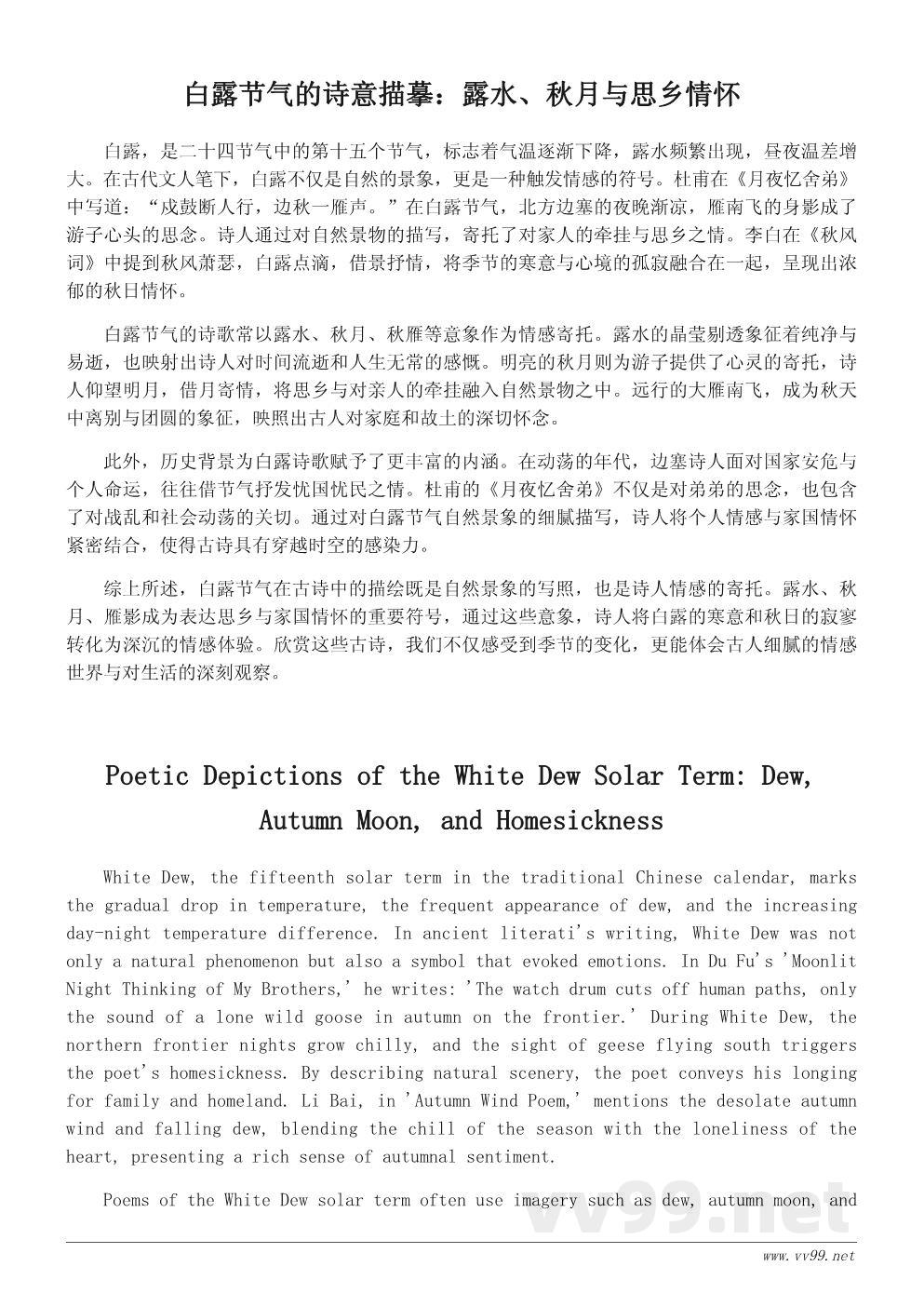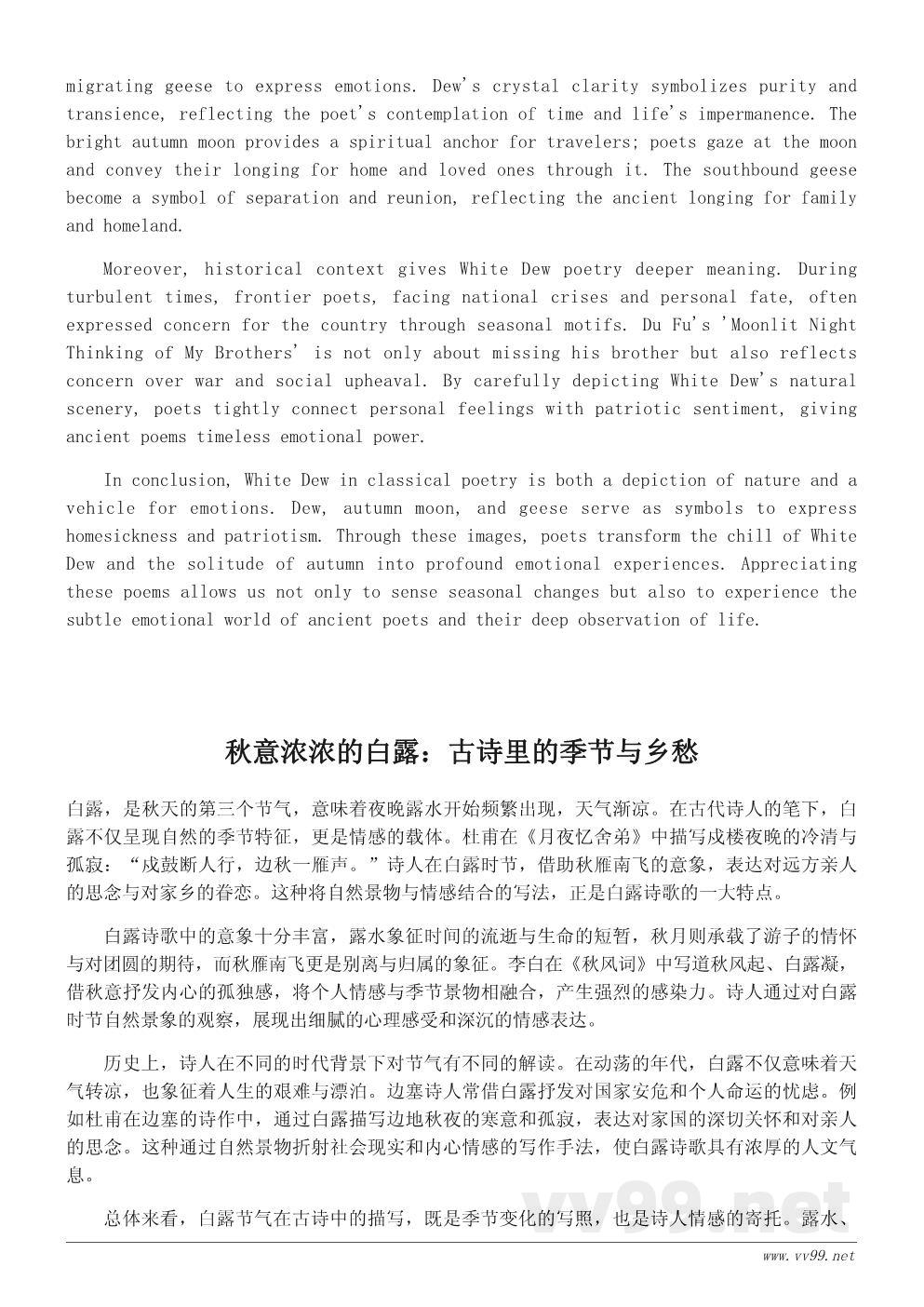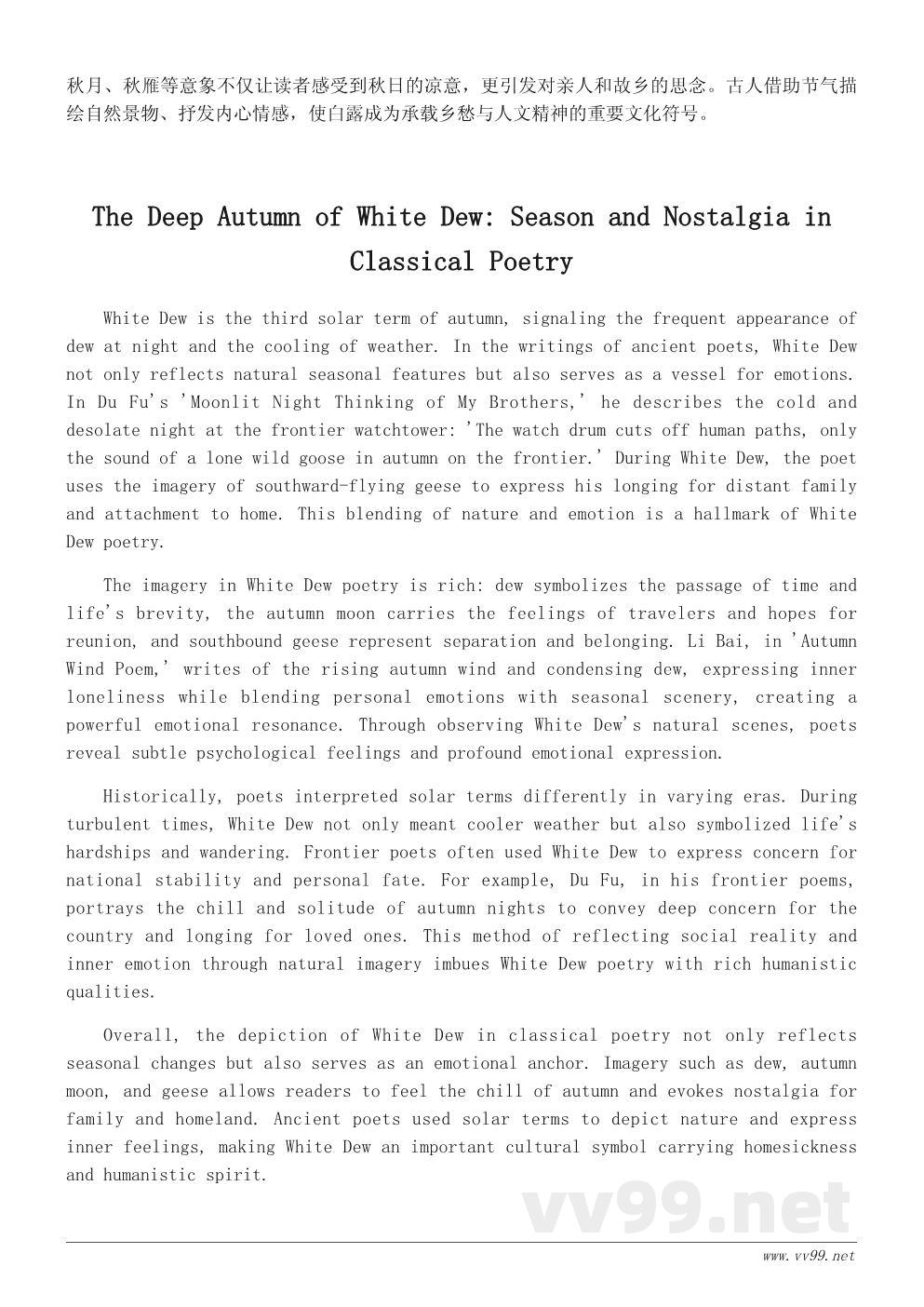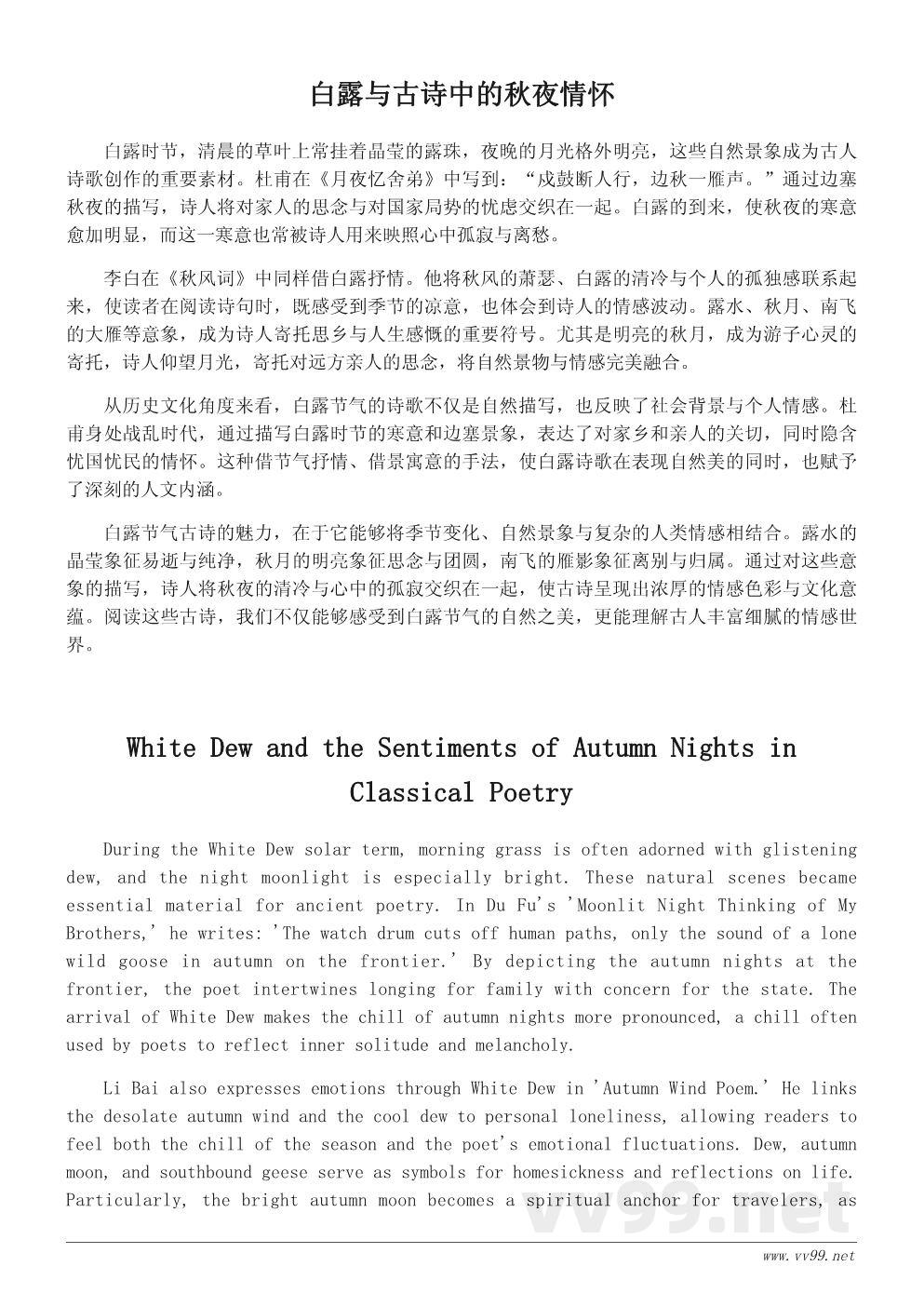白露节气的诗意描摹:露水、秋月与思乡情怀
白露,是二十四节气中的第十五个节气,标志着气温逐渐下降,露水频繁出现,昼夜温差增大。在古代文人笔下,白露不仅是自然的景象,更是一种触发情感的符号。杜甫在《月夜忆舍弟》中写道:“戍鼓断人行,边秋一雁声。”在白露节气,北方边塞的夜晚渐凉,雁南飞的身影成了游子心头的思念。诗人通过对自然景物的描写,寄托了对家人的牵挂与思乡之情。李白在《秋风词》中提到秋风萧瑟,白露点滴,借景抒情,将季节的寒意与心境的孤寂融合在一起,呈现出浓郁的秋日情怀。
白露节气的诗歌常以露水、秋月、秋雁等意象作为情感寄托。露水的晶莹剔透象征着纯净与易逝,也映射出诗人对时间流逝和人生无常的感慨。明亮的秋月则为游子提供了心灵的寄托,诗人仰望明月,借月寄情,将思乡与对亲人的牵挂融入自然景物之中。远行的大雁南飞,成为秋天中离别与团圆的象征,映照出古人对家庭和故土的深切怀念。
此外,历史背景为白露诗歌赋予了更丰富的内涵。在动荡的年代,边塞诗人面对国家安危与个人命运,往往借节气抒发忧国忧民之情。杜甫的《月夜忆舍弟》不仅是对弟弟的思念,也包含了对战乱和社会动荡的关切。通过对白露节气自然景象的细腻描写,诗人将个人情感与家国情怀紧密结合,使得古诗具有穿越时空的感染力。
综上所述,白露节气在古诗中的描绘既是自然景象的写照,也是诗人情感的寄托。露水、秋月、雁影成为表达思乡与家国情怀的重要符号,通过这些意象,诗人将白露的寒意和秋日的寂寥转化为深沉的情感体验。欣赏这些古诗,我们不仅感受到季节的变化,更能体会古人细腻的情感世界与对生活的深刻观察。
Poetic Depictions of the White Dew Solar Term: Dew, Autumn Moon, and Homesickness
White Dew, the fifteenth solar term in the traditional Chinese calendar, marks the gradual drop in temperature, the frequent appearance of dew, and the increasing day-night temperature difference. In ancient literati's writing, White Dew was not only a natural phenomenon but also a symbol that evoked emotions. In Du Fu's 'Moonlit Night Thinking of My Brothers,' he writes: 'The watch drum cuts off human paths, only the sound of a lone wild goose in autumn on the frontier.' During White Dew, the northern frontier nights grow chilly, and the sight of geese flying south triggers the poet's homesickness. By describing natural scenery, the poet conveys his longing for family and homeland. Li Bai, in 'Autumn Wind Poem,' mentions the desolate autumn wind and falling dew, blending the chill of the season with the loneliness of the heart, presenting a rich sense of autumnal sentiment.
Poems of the White Dew solar term often use imagery such as dew, autumn moon, and migrating geese to express emotions. Dew's crystal clarity symbolizes purity and transience, reflecting the poet's contemplation of time and life's impermanence. The bright autumn moon provides a spiritual anchor for travelers; poets gaze at the moon and convey their longing for home and loved ones through it. The southbound geese become a symbol of separation and reunion, reflecting the ancient longing for family and homeland.
Moreover, historical context gives White Dew poetry deeper meaning. During turbulent times, frontier poets, facing national crises and personal fate, often expressed concern for the country through seasonal motifs. Du Fu's 'Moonlit Night Thinking of My Brothers' is not only about missing his brother but also reflects concern over war and social upheaval. By carefully depicting White Dew's natural scenery, poets tightly connect personal feelings with patriotic sentiment, giving ancient poems timeless emotional power.
In conclusion, White Dew in classical poetry is both a depiction of nature and a vehicle for emotions. Dew, autumn moon, and geese serve as symbols to express homesickness and patriotism. Through these images, poets transform the chill of White Dew and the solitude of autumn into profound emotional experiences. Appreciating these poems allows us not only to sense seasonal changes but also to experience the subtle emotional world of ancient poets and their deep observation of life.
秋意浓浓的白露:古诗里的季节与乡愁
白露,是秋天的第三个节气,意味着夜晚露水开始频繁出现,天气渐凉。在古代诗人的笔下,白露不仅呈现自然的季节特征,更是情感的载体。杜甫在《月夜忆舍弟》中描写戍楼夜晚的冷清与孤寂:“戍鼓断人行,边秋一雁声。”诗人在白露时节,借助秋雁南飞的意象,表达对远方亲人的思念与对家乡的眷恋。这种将自然景物与情感结合的写法,正是白露诗歌的一大特点。
白露诗歌中的意象十分丰富,露水象征时间的流逝与生命的短暂,秋月则承载了游子的情怀与对团圆的期待,而秋雁南飞更是别离与归属的象征。李白在《秋风词》中写道秋风起、白露凝,借秋意抒发内心的孤独感,将个人情感与季节景物相融合,产生强烈的感染力。诗人通过对白露时节自然景象的观察,展现出细腻的心理感受和深沉的情感表达。
历史上,诗人在不同的时代背景下对节气有不同的解读。在动荡的年代,白露不仅意味着天气转凉,也象征着人生的艰难与漂泊。边塞诗人常借白露抒发对国家安危和个人命运的忧虑。例如杜甫在边塞的诗作中,通过白露描写边地秋夜的寒意和孤寂,表达对家国的深切关怀和对亲人的思念。这种通过自然景物折射社会现实和内心情感的写作手法,使白露诗歌具有浓厚的人文气息。
总体来看,白露节气在古诗中的描写,既是季节变化的写照,也是诗人情感的寄托。露水、秋月、秋雁等意象不仅让读者感受到秋日的凉意,更引发对亲人和故乡的思念。古人借助节气描绘自然景物、抒发内心情感,使白露成为承载乡愁与人文精神的重要文化符号。
The Deep Autumn of White Dew: Season and Nostalgia in Classical Poetry
White Dew is the third solar term of autumn, signaling the frequent appearance of dew at night and the cooling of weather. In the writings of ancient poets, White Dew not only reflects natural seasonal features but also serves as a vessel for emotions. In Du Fu's 'Moonlit Night Thinking of My Brothers,' he describes the cold and desolate night at the frontier watchtower: 'The watch drum cuts off human paths, only the sound of a lone wild goose in autumn on the frontier.' During White Dew, the poet uses the imagery of southward-flying geese to express his longing for distant family and attachment to home. This blending of nature and emotion is a hallmark of White Dew poetry.
The imagery in White Dew poetry is rich: dew symbolizes the passage of time and life's brevity, the autumn moon carries the feelings of travelers and hopes for reunion, and southbound geese represent separation and belonging. Li Bai, in 'Autumn Wind Poem,' writes of the rising autumn wind and condensing dew, expressing inner loneliness while blending personal emotions with seasonal scenery, creating a powerful emotional resonance. Through observing White Dew's natural scenes, poets reveal subtle psychological feelings and profound emotional expression.
Historically, poets interpreted solar terms differently in varying eras. During turbulent times, White Dew not only meant cooler weather but also symbolized life's hardships and wandering. Frontier poets often used White Dew to express concern for national stability and personal fate. For example, Du Fu, in his frontier poems, portrays the chill and solitude of autumn nights to convey deep concern for the country and longing for loved ones. This method of reflecting social reality and inner emotion through natural imagery imbues White Dew poetry with rich humanistic qualities.
Overall, the depiction of White Dew in classical poetry not only reflects seasonal changes but also serves as an emotional anchor. Imagery such as dew, autumn moon, and geese allows readers to feel the chill of autumn and evokes nostalgia for family and homeland. Ancient poets used solar terms to depict nature and express inner feelings, making White Dew an important cultural symbol carrying homesickness and humanistic spirit.
小提示:上面此文档内容仅展示完整文档里的部分内容, 若需要下载完整文档请 点击免费下载完整文档 。





